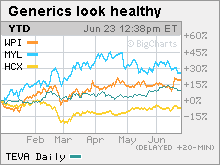Stocks sneeze, health care catches cold
Drugmakers, insurers and biotechs often do well when investors are worried about the economy. But with reform looming, the sector's been a sick patient.

 |
| The S&P Healthcare Index (HCX) has taken its lumps this year. But generic drugmakers Teva (TEVA), Watson (WPI) and Mylan (MYL) are thriving. |
NEW YORK (CNNMoney.com) -- What's that sound? That rumbling from Wall Street? The broad market has cooled off this month. But some stocks are taking the June swoon in stride, thank you very much.
It's what basketball broadcaster Marv Albert would describe as the crowd taking up the chant of defense.
Many utility stocks, due to their relatively steady business of collecting monthly payments and providing investors with fat dividends, are actually up this month.
Boring slow-growth telecoms Verizon and Embarq are also up in June. So are stodgy consumer staples firms like J.M. Smucker, General Mills and Clorox.
But where oh where are the health care stocks? They're down along with such losers as banks and tech.
The difference is that health care stocks are often viewed as good hiding places in a recession. After all, if you're concerned about your job security, you might be willing to convince your kid that he doesn't need a new pair of Nike LeBron VI "kicks" for $140. But if Junior comes down with the sniffles, are you not going to take him to the pediatrician?
Yet, the S&P Healthcare Index is flat so far this month, while Big Pharma giant Merck (MRK, Fortune 500), insurer UnitedHealthcare (UNH, Fortune 500) and biotech firm Genzyme (GENZ) are all down nearly 10%
Jack Ablin, chief investment strategist with Harris Private Bank in Chicago, summed up the problem in one word: politics.
"The sector is like a yo-yo tethered to the conversations in Washington. There is cause for concern because of the potential for upheaval," he said.
President Obama is eager for health care reform. But there is little consensus on how to do it. Will there actually be a public health plan? Will drugmakers, which have already agreed to some price cuts for seniors in Medicare, be forced to go even further?
With all those unanswered questions, Ablin said that health care stocks are trapped in a no-win situation.
"Health care took a back seat during the rebound, but now it's role as a typical defensive area in the market has been undermined as well," Ablin said. "The perception is that it will no longer be business as usual so investors are worried about the impact of reform on profits."
Talkback: What do you think needs to be done to reform the nation's health care industry? Leave your comments at the bottom of this story.
Along those lines, Cowen & Co. pharmaceutical analyst Steve Scala did an analysis of how much of a profit hit the big drug companies could take as a result of their agreement to fund half of the cost of brand-name drugs for seniors falling into Medicare's so-called "doughnut hole" of coverage.
Scala wrote in a report Tuesday that filling this hole would be "costly but manageable." He found that the companies that would likely suffer the largest drop in profits were Eli Lilly and AstraZeneca while Wyeth, GlaxoSmithKline and Pfizer would experience the smallest decline in earnings.
Ted Parrish, co-manager of the Henssler Equity fund, agreed that the possibility of a real change to the way big health care firms do business is more likely now than at any point in the past few decades.
For that reason, he said his fund, which usually has had heavy exposure to the health care group, has been trimming its positions in pharmaceutical firms, HMOs and medical device makers.
Simply put, even if you believe that the long-term demographic trend favors health care -- i.e. Baby Boomers aging and needing more medical attention -- treating illness may no longer be as profitable.
"It's clear that health care costs have to come under control. We've known for years something has to be done and this time it looks like reform is for real," Parrish said.
Still, this doesn't mean that there are no opportunities in health care. For one, the changing landscape is likely to lead to more consolidation. There already have been two blockbuster mergers announced this year -- Pfizer buying Wyeth and Merck's acquisition of Schering-Plough.
More recently, generic drugmakers and biotechs have become the focus of the M&A market, with generic leader Watson Pharmaceuticals (WPI) buying privately held Arrow Group for $1.75 billion and diversified health care giant Johnson & Johnson (JNJ, Fortune 500) scooping up cancer treatment specialist Cougar Biotechnology for $1 billion.
Parrish said generics firms, which make cheaper versions of drugs that are no longer protected by patents, should continue to do well given the focus on reducing the cost of medication.
His fund owns shares of Israeli-based Teva Pharmaceutical Industries (TEVA), the world's largest generic drug firm. And shares of Teva, Watson and fellow generic maker Mylan (MYL, Fortune 500) are all up year-to-date.
As for biotech, Parrish thinks more big firms like Johnson & Johnson, which his fund also owns, will seek to broaden their pipeline with biotech acquisitions.
But instead of gambling on the biotech firms themselves, many of which are unproven and unprofitable, he'd rather own solid leaders like J&J that have a history of making smart deals.
"It's difficult to pull the trigger on biotechs because a lot of them are one-trick ponies," Parrish said.
Still, as long as investors remain in the dark about what exactly health care reform is going to look like, much of the sector will probably remain stuck in Wall Street's sick ward -- regardless of whether recovery or recession fears rule the daily headlines.
Talkback:What do you think needs to be done to reform the nation's health care industry? ![]()

